
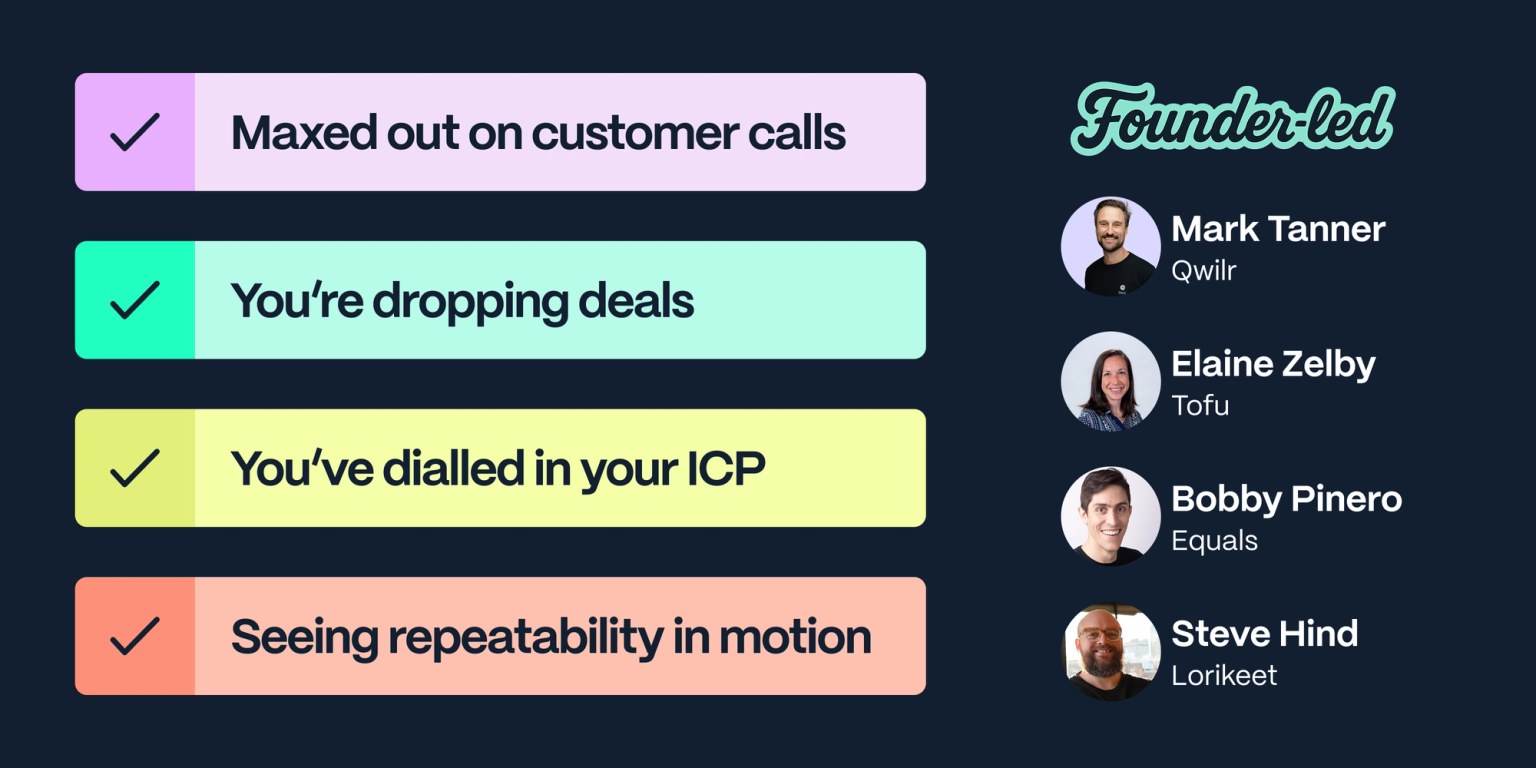
It’s the evergreen founder question: “When should I make my first sales hire?”
Here are a few things I’ve learned about timing and who not to hire — with backup from some other seed-to-Series A founders.
(I’ve written about my own experience making the first sales hire here)
Wait as long as you possibly can
It’s better to hire too late than too early, because you risk missing the value that comes from selling (and all the other learnings that come with it).
There's the common objection: "I need someone to complement my skill set." Which, if we're being honest, is just escaping the discomfort of selling that so many founders have.
Salespeople aren't Band-Aids. Hiring for sales and asking them to figure out sales is actually a high-risk move.
Mark Tanner, who co-founded Qwilr in 2014 and advises other startups on sales, describes it as “the worst case of magical thinking” to assume that a sales professional can come in and succeed without at least the outline of a playbook. You should at least know who your ICP is, how you handle pricing, and where you source the best leads. These are things you figure out through doing sales yourself.
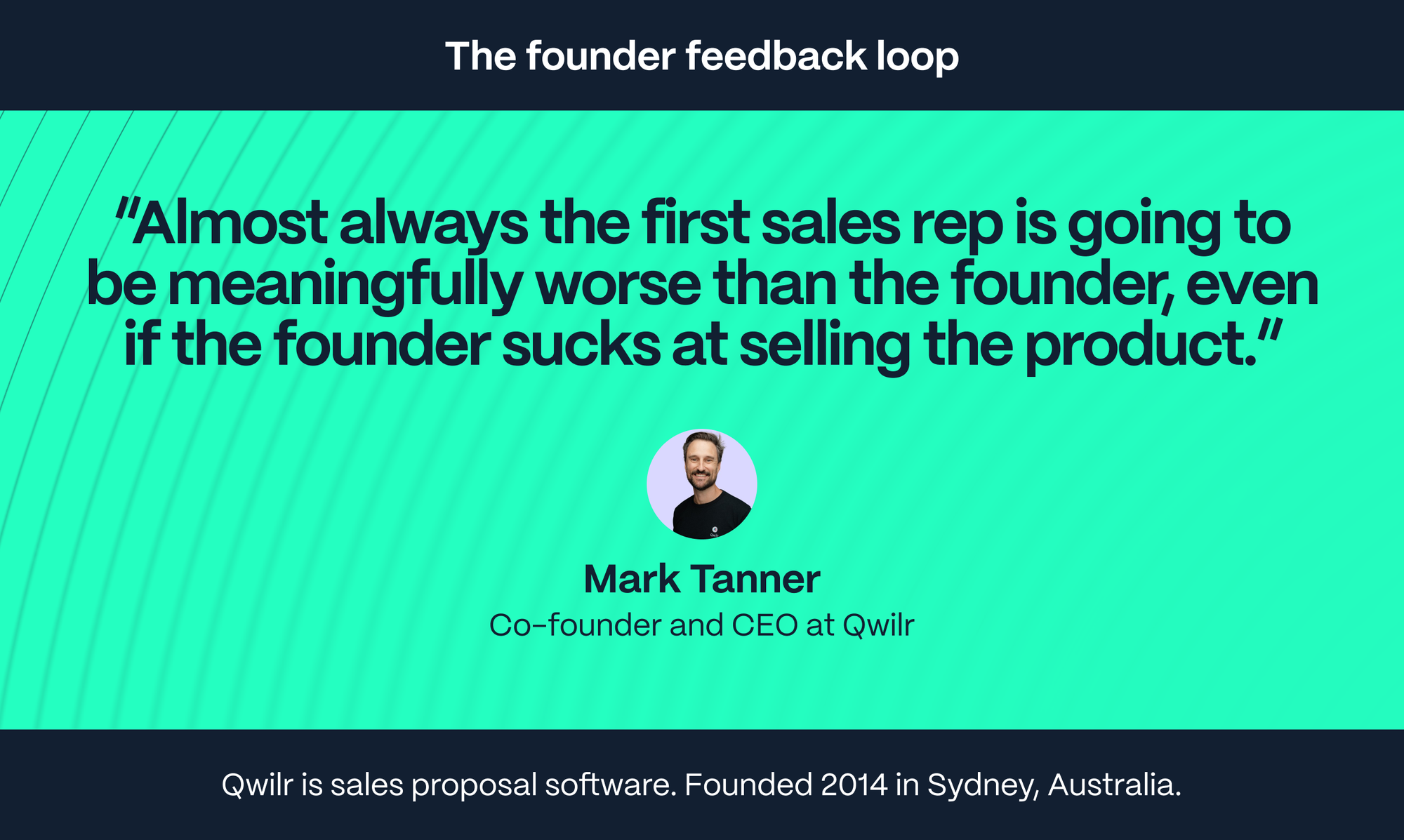
Product-market fit is like gears in a car. Most startups never click into first, and it's obviously very important to do that. But first is not gonna take you where you need to go. The power of founder-led sales is having that feedback loop that helps you click into second gear. Maybe that's moving up market, opening a new geo, or launching a different product.
Early days of Qwilr, I was just out there, I would meet anyone, until we had some sense of who our ICP was and whether the product would work well for them.
- Mark Tanner, Co-founder and CEO at Qwilr
You’ll know when it’s time
Declaring calendar bankruptcy is not the only thing that needs to happen to know it's time to hire. It might be the most obvious sign, but there are some other key things that need to be in place before you send for help. Based on my own experience and conversations with other founders, here’s the simple checklist I’d use:
1. You’re maxed out on customer calls
You need to be really honest with yourself on this one. In the early days, something like 10 customer calls a day is not unusual. Yes, you’re going to be exhausted at the end of your day, and that’s the reason that salespeople earn so much money — it’s hard work.
Even since we hired for sales at Clarify, I’m still up at 6 or 7 every morning to talk to customers, and I’ll jump on a call with a customer on the weekend to solve a support issue. I pulled the numbers, and I was on 81 calls last month — customer calls, not internal meetings.
If you’re doing so many calls with prospects that you can’t scale sales independently anymore, that’s your sign.
2. Deals aren’t closing because of you
Elaine, founder of Tofu, told me that she didn’t hire until she started dropping a lot of balls mid-sales cycle.
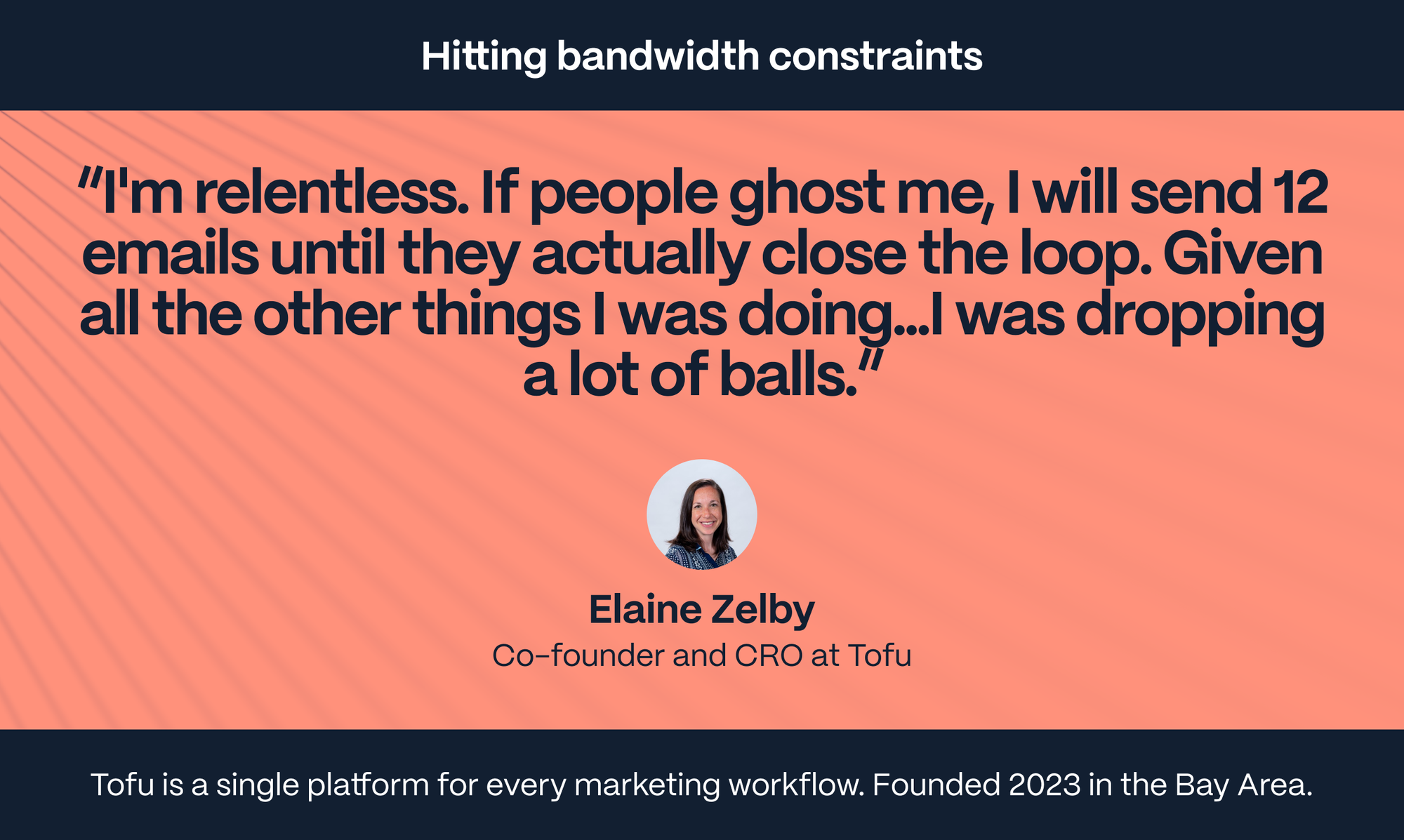
3. You’ve dialed in your ICP and use cases
Equals built a super horizontal product, but they only started to have real success in the market when they tightly defined use cases for the product and the people who buy solutions for them.
“For us, I can tell you with a high degree of specificity, there are three people who buy Equals,” explains co-founder Bobby Pinero. “It's a first finance hire, an early RevOps hire, or a founder. They're coming to us because they can't consistently report on their SaaS metrics revenue, and they're either fundraising or have just started a job and things are kind of messy.”
4. You can turn what you’re doing into a system
Without that degree of specificity — who buys your product, what do they use it for, and what are the events that drive them to purchase — it’s too early to start thinking about scaling sales.
“Before I could name any of that specificity, I couldn't train a salesperson to join the company, to go outbound to somebody, to get on a call with them, to be able to know who was a good prospect, who was a bad prospect, to know how to onboard them properly, to know how to price that solution properly,” explains Bobby. “Once you have that, you can build a system around it.”
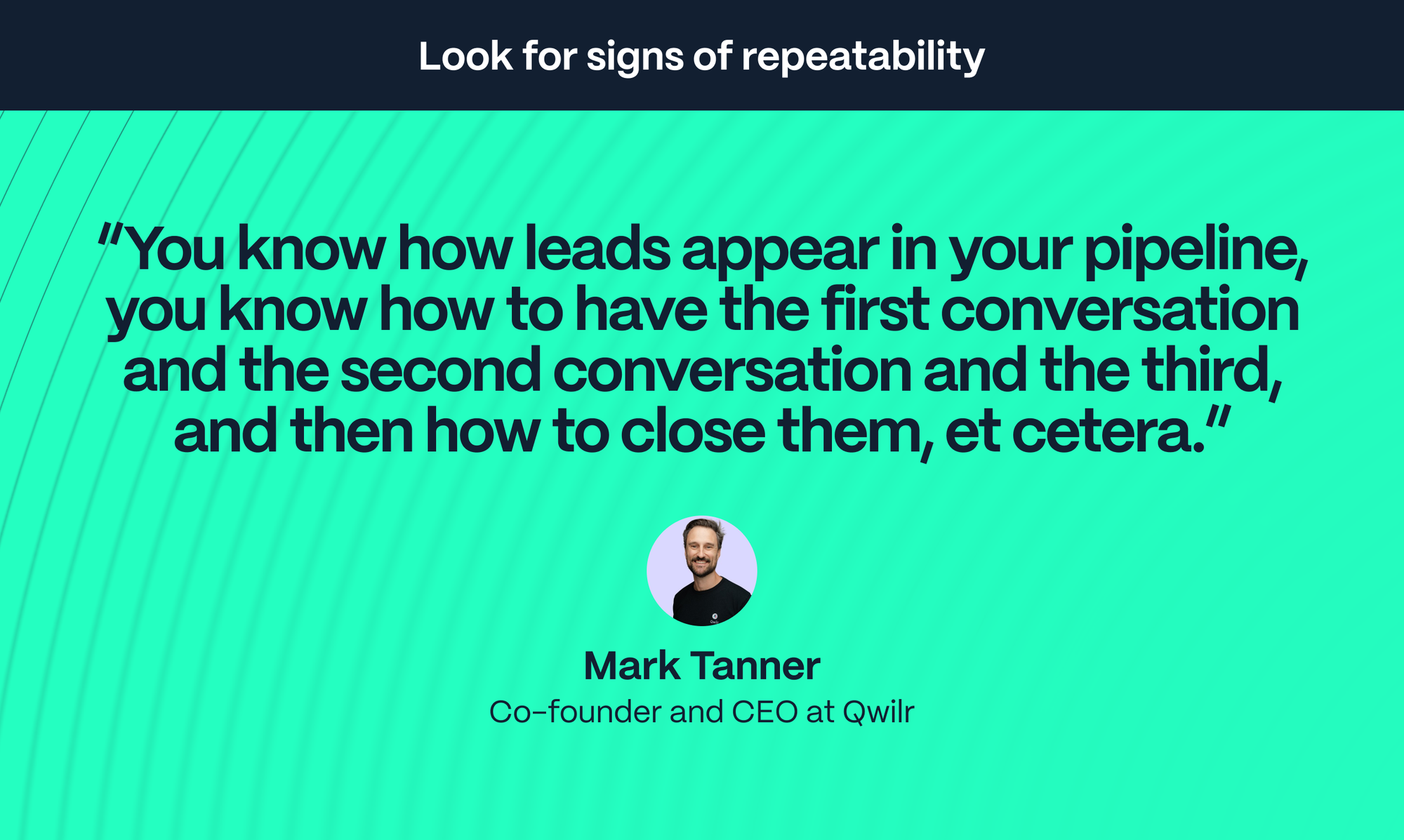
It doesn't need to be perfect, but you need to feel like you could actually train someone and they would succeed.
- Mark Tanner, Co-founder and CEO at Qwilr
Be clear what you are hiring for
I felt the pain of being the only salesperson at Clarify for what felt like a very long time. But even then, we hired early. But we hired to accelerate our learning, not to accelerate revenue.
We made sure feedback loops were in place from sales to the rest of the org. Every week, our salesperson reports back the top three things he’s hearing from customers that are blocking adoption. Or the top three things that are blocking them from converting to pay.
These are invaluable insights, allowing me to focus more of my time on the product. I'm still in a lot of customer conversations, but they’re in a bunch that I can’t be. It's been huge for validating what we should be building.
Knowing who to hire
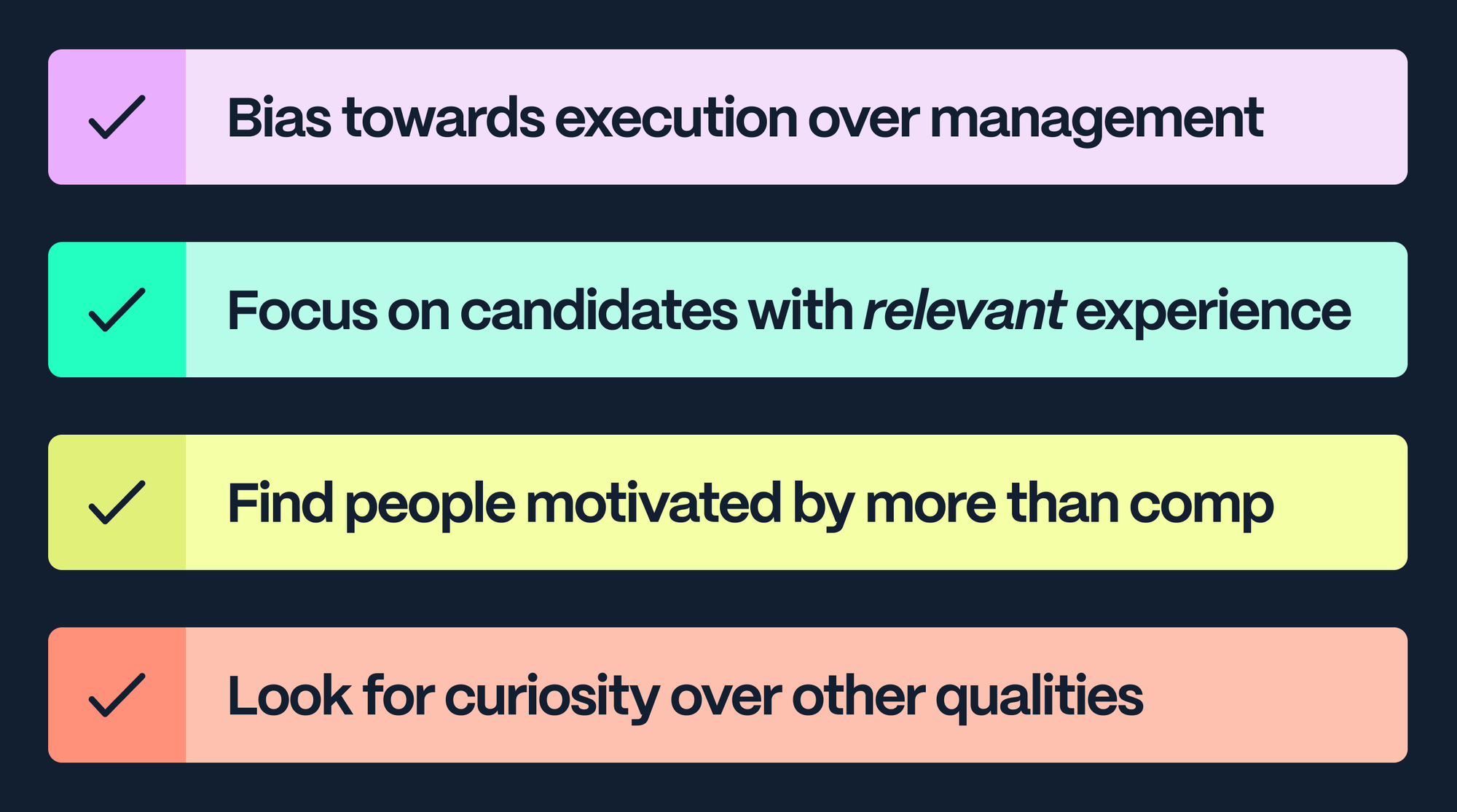
Before you try to hire an experienced salesperson with incredible logos on their resume (“senior sales manager at Salesforce”), stop and think about it. Can they actually do well at a startup?
Somebody who was successful selling Salesforce was likely doing less selling and more order taking. With a massive brand like that, you're not selling so much as people are buying. It’s transactional rather than strategic.
At an early-stage startup, you don’t have a strong brand behind you. You don’t have case studies to reference. You don’t have the money for fancy steak dinners or field events. And the product is probably immature and a bit buggy.
You need someone with a high growth mindset, who is tenacious, has a great attitude, and who thinks, “Hey, I'm okay getting kicked in the teeth for the next six to 12 months as we figure this out.” They are there because they want the experience. If they don’t have that mindset, they're gonna fail.
(I go even more in-depth on what to look for in candidates in my previous post, including 10 questions you should ask potential sales hires)
1. Bias towards execution
In the early days you don't want to hire a sales leader, and definitely not a VP of Sales, because you are the sales leader. It’s a mistake that Elaine Zelby has seen, both in her time as a founder and while working as a VC.
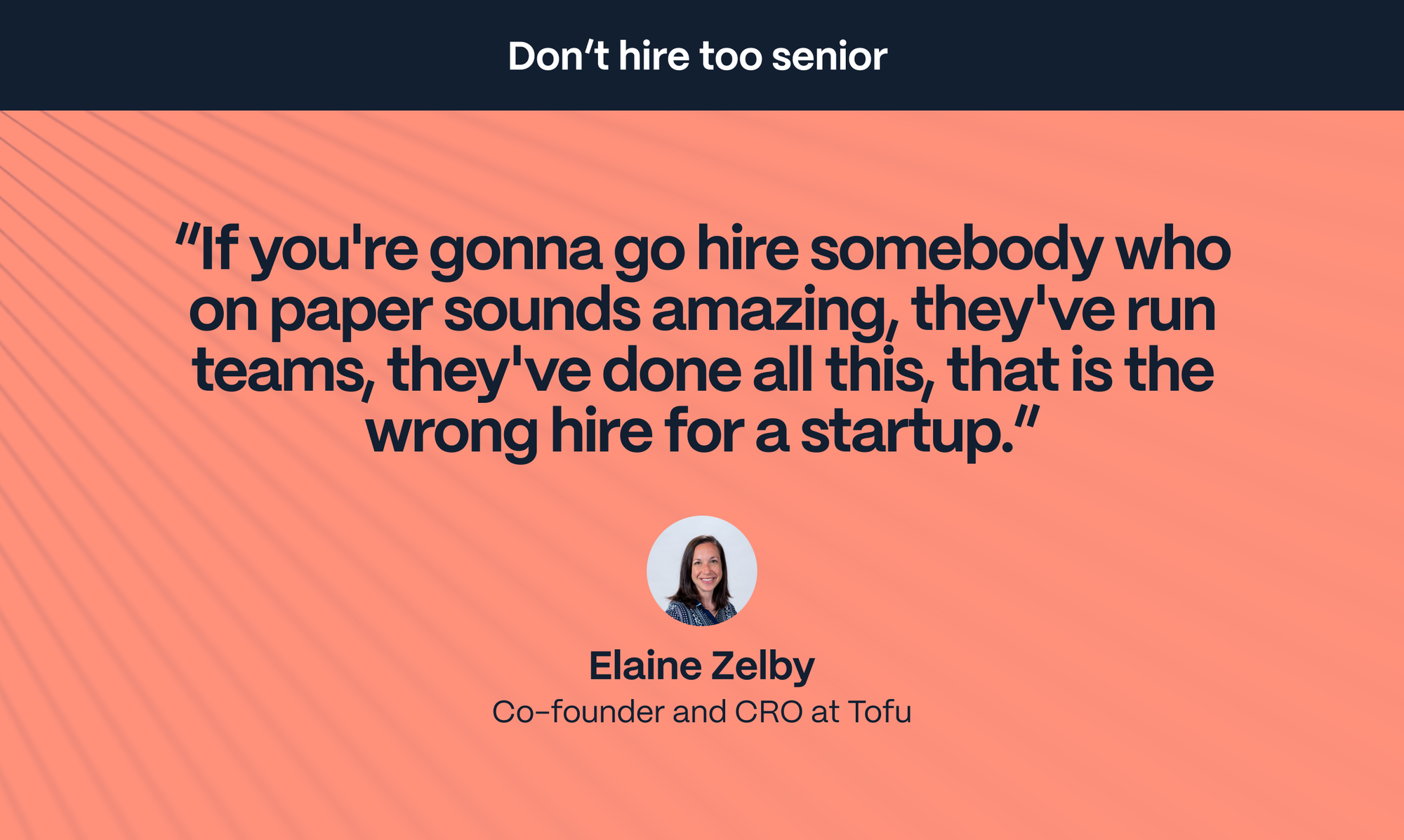
I think so many founders hire somebody way, way, way too senior for almost every role, every first hire. You need somebody who has zero intention in the next 12 months of managing a team. If the first thing they wanna do is go hire a few people under them, unless you're really at that scale, which is pretty rare, they are not the right hire.
- Elaine Zelby, Co-founder and CRO at Tofu
2. Relevant experience
While she might not want seniority, Elaine does look for experience. She wouldn’t hire an Account Executive (AE) who has never done it before, or give a first shot to a rockstar SDR who wants to become an AE. There’s simply too much hand-holding and training involved for a resource-limited startup. You’re already going to have enough work training up an experienced salesperson in your system, without having to teach them the fundamentals as well.
Two specific things that Elaine looks for are experience with similar-sized deals and similar-length sales cycles, which she thinks is more important than experience selling to your ICP.
I do think that understanding a two-day versus 45-day versus eight month sales cycle looks wildly different. And a $10K deal, $40K deal, and $300K deal looks wildly different. So, if your price point is around $40K, I would never bring in somebody who's never sold above $15K. They're not gonna know how to run a sales cycle at that stage. I also wouldn't index on somebody who wants to go and sell mid-six-figure deals. That's just also not going to be the right fit.
Other founders look for relevant experience in non-traditional places.
Steve Hind, co-founder of Lorikeet, a provider of AI-powered customer service concierges, says his first sales rep had “never closed an enterprise SaaS contract” before joining Lorikeet. Steve was tempted to hire traditional enterprise salespeople to complement his lack of sales background. He interviewed a lot of people with great resumes, but the right fit turned out to be an agency founder. Selling professional services takes a lot of customer education, which is exactly what Lorikeet has found it needs to sell enterprise AI.
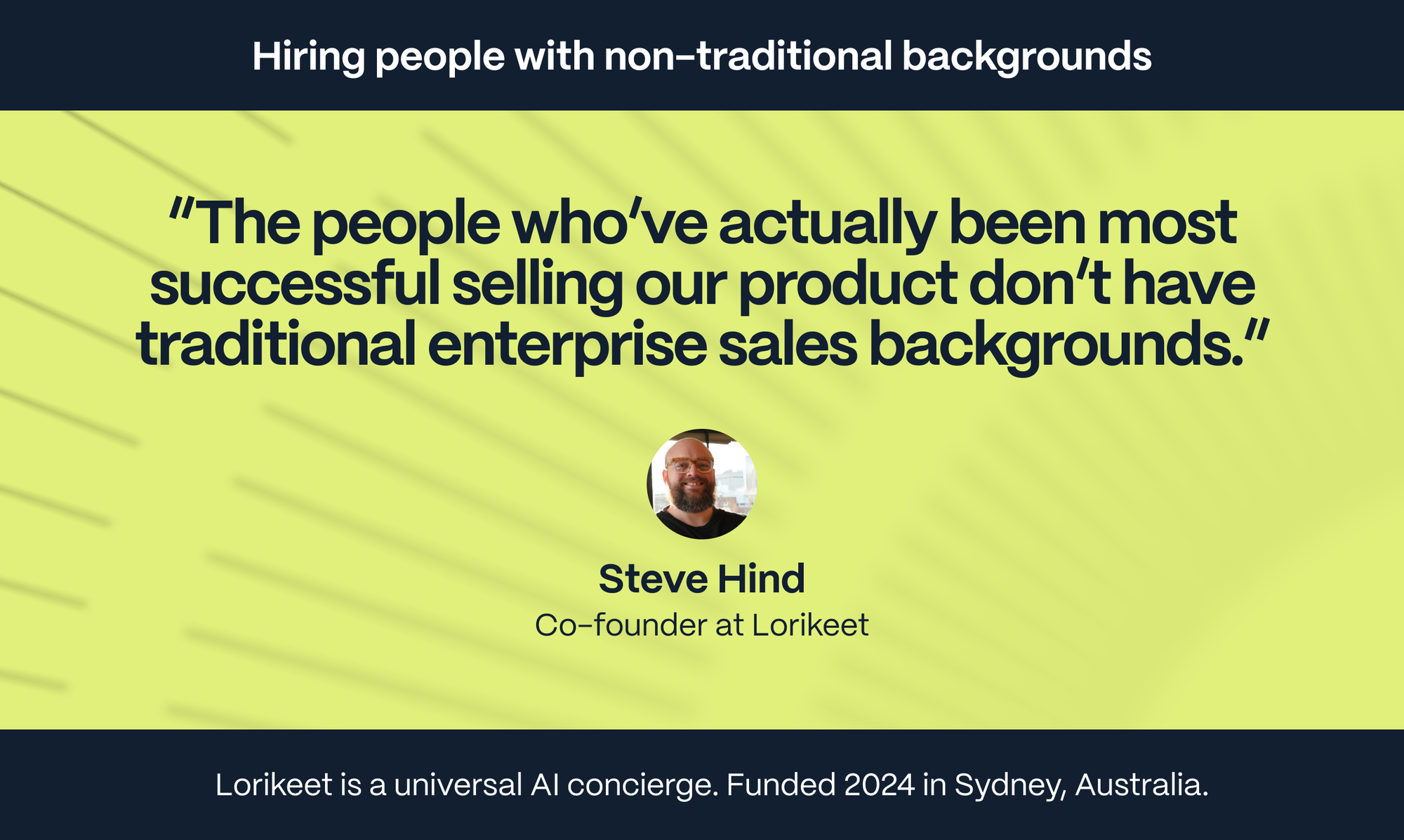
We’ve definitely seen a lot of people with what looked like the right sales experience on paper that doesn’t translate into the way we want to operate.
We’ve organically landed at ‘people who are good at being thought partners to leaders thinking about AI.’ And this is because adopting AI, especially in a customer-facing space, is quite emotionally fraught, quite risky, and quite a big change.
So people don’t need someone who’s going to kind of run them through a qualification checklist, do a demo and send them a contract. They need someone who’s going to be a partner in helping them think about how to make that transition work in their unique circumstances. And it turns out if you can do that, then learning how to say, navigate a procurement conversation, is the easy part, not the hard part.
- Steve Hind, co-founder at Lorikeet
You can de-risk this strategy with a trial. Steve says, “We hire everyone on our team through paid work trials. So people are spending a meaningful amount of time with us before we make the call.”
3. Not just motivated by comp
As a founder, your job is to find someone who thrives in ambiguity and doesn’t mind operating when their back is against the wall. They want that experience and are not purely motivated by compensation — they could probably earn more at an established company. They need to be motivated by helping a company grow from zero to $1 million in ARR — and all of the learning, accolades, and, yes, equity that comes with that.
4. Curious
Mark Tanner says that qualities like coachability, ambition, or just having done hard things, whether that’s having represented Australia in kayaking or managing a band on a tour of Europe, are clues that someone has the aptitude for sales. But there’s one quality he looks for over everything else.
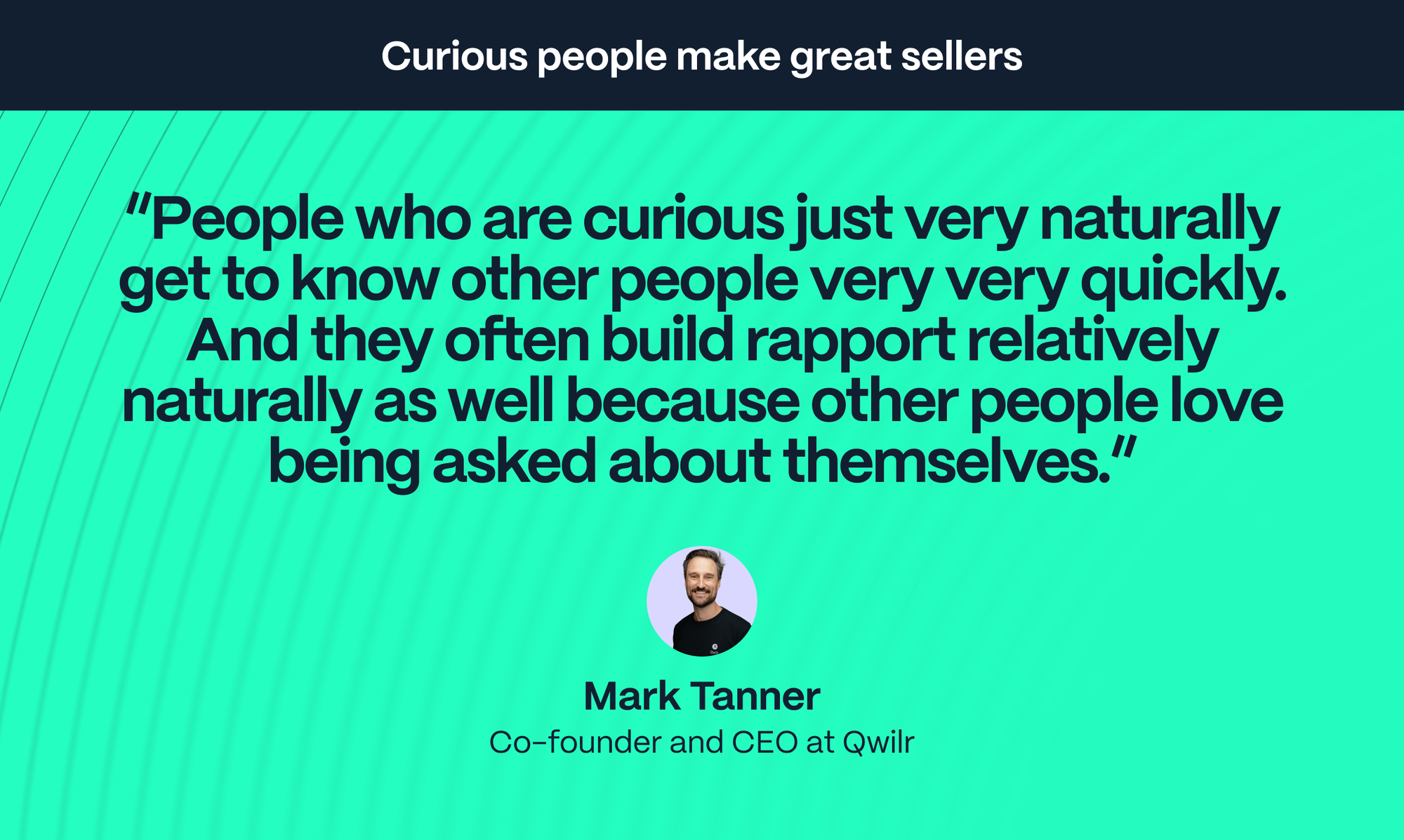
Salespeople need to be curious. If they’re not curious, it's going to be a bad time. You just need to have people who are interested in other people and who ask lots of questions.
They then turn this understanding of what the real situation is and flip it into, ‘cool, I've understood all the things I need to understand, let me now tell you what Qwilr is and why you should care.’
- Mark Tanner, Co-founder and CEO at Qwilr
Your mileage may vary
Like most things in startups, there is no magical one-size-fits-all answer. I can’t tell you when the time is right to bring on your first professional sales person (or even if that first hire needs to be a “professional.”) But I do know that most founders try to do it too early. Learn how to become a sales leader yourself first, and pay attention to what’s needed to close your deals. That will guide you to the person with the right personality traits and skills to scale up your success.
Get our newsletter
Subscribe for weekly essays on GTM, RevTech, and Clarify’s latest updates.
Thanks for subscribing! We'll send only our best stuff. Your information will not be shared and you can unsubscribe at any time.